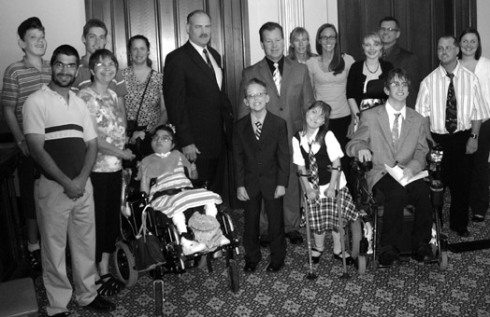
Katie Birchmeier (10) and Conor Waterman (9) before adressing the Michigan Disability Caucus on June 23.
On June 23 children with disabilities shared their transportation needs with members of Michigan’s Senate and House. These brave youth addressed the Michigan’s Disability Caucus in the Speaker’s Library of the State Capitol. Katie Birchmeier (10), Conor Waterman (9), James Kleimola (18) and Chris Mistopoulos (25), provided personal stories about their ability to access the community and the challenges they have faced while walking and biking in Michigan.
In addition, PEAC (Programs to Educate All Cyclists) addressed the bi-partisan, bi-cameral Michigan Legislative Disability Caucus. During a one-hour presentation PEAC focused on educating the Caucus about their mission and programs, and advocated for greater state support of cycling by persons with disabilities. PEAC is a Michigan based nonprofit that is recognized as the national leader for cyclists with disabilities.

Representative John Gleason and Senator Randy Richarville with PEAC supporters in the Spearker's Library of the State Capitol.
The ability to travel in active modes of transportation is essential to access our community for all individuals. Bicycling can become the primary mode of travel for individuals who cannot get a driver’s license. A key component of the Complete Streets legislation that recently passed the Michigan House, and that is currently being considered by the Senate, is ensuring that streets meet the “varying mobility needs of all legal users of the roadway, of all ages and abilities.” The ability to travel independently is not just an access issue, but an issue of human dignity. Individuals forced to rely on family and friends to meet all transportation needs reinforce ideas regarding inabilities, burden to others and second class citizenship. Clearly, passing Complete Streets legislation would go along way towards establishing a statewide policy regarding equal access issues.
The transportation challenges begin with the trip to school where some students with disabilities ride in a little bus that has become a symbol of ridicule by our society regarding disabilities. How many times have we heard jokes about riding a “short bus” to school? Separating children during transportation has caused an unintended segregation of students. Students walking and riding together will acquire transportation skills and form bonds that will improve the social development and acceptance of all students.
Transportation is the number one barrier to both employment and independent living for individuals with disabilities. The ability to walk and bike is the foundation to almost every trip. Individuals can use their bike or feet to expand the service of the transit system by walking or riding to and from bus stops. Even if you drive you usually do not get to park inside your destination, so you have to walk through parking lots and on sidewalks.
Michigan is leading the way for inclusion of students with disabilities in Safe Routes to School (SRTS) programs. However, the federal legislation has no dedicated funding or mandates regarding inclusion of students with disabilities. Thus, forty-eight states have not funded any education and encouragement SRTS Programs targeting students with disabilities during the program’s first 5 years and $612,000,000 of funding. Michigan is one of two states that have attempted to address the needs of individuals with disabilities. This year Michigan will dedicate $24,000 to develop pilot programs in our state. Our State SRTS needs federal support to meet the needs of students with disabilities, such as dedicated funding or national pilot programs to demonstrate best practices.
















Leave a comment
Comments feed for this article